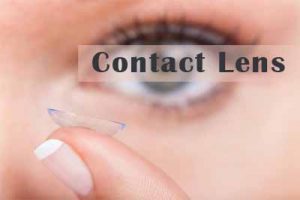- Home
- Editorial
- News
- Practice Guidelines
- Anesthesiology Guidelines
- Cancer Guidelines
- Cardiac Sciences Guidelines
- Critical Care Guidelines
- Dentistry Guidelines
- Dermatology Guidelines
- Diabetes and Endo Guidelines
- Diagnostics Guidelines
- ENT Guidelines
- Featured Practice Guidelines
- Gastroenterology Guidelines
- Geriatrics Guidelines
- Medicine Guidelines
- Nephrology Guidelines
- Neurosciences Guidelines
- Obs and Gynae Guidelines
- Ophthalmology Guidelines
- Orthopaedics Guidelines
- Paediatrics Guidelines
- Psychiatry Guidelines
- Pulmonology Guidelines
- Radiology Guidelines
- Surgery Guidelines
- Urology Guidelines
Contact lens delivering antihistamine relieves symptoms of ocular allergy

USA: An antihistamine-releasing contact lens (CLs) achieved a significant reduction in mean ocular itching scores, both at 15 minutes and 12 hours after lens insertion in patients with ocular allergy such as allergic conjunctivitis, according to findings from two parallel clinical trials published in the journal Cornea.
The trial by Brian Pall, Johnson & Johnson Vision, Jacksonville, FL, and colleagues tested contact lens (CL)-based drug delivery system for therapeutic delivery of the antihistamine ketotifen.
Allergic conjunctivitis (AC) is the most common type of ocular allergy. It is clinically defined as an IgE-mediated hypersensitivity response to the exposure of the ocular surface to one or more allergens, including tree or grass pollens, pet dander, or dust mite dander. AC and related conditions, although not sight-threatening but can lead to a significant loss in patient productivity and quality of life.
Patients using contact lenses are particularly impacted by AC. The use of CLs may lead to ocular itch that is often responded by patients through rubbing of eyes. This may further exacerbate allergic symptoms. Antihistamines are characterized by a rapid, prolonged suppression of allergen-associated itch responses.
Ketotifen, like many ocular antihistamines, possesses both antihistamine and mast-cell stabilizing properties. In addition, ketotifen has been shown to attenuate the accumulation of mast cells, neutrophils, and eosinophils at the sites of allergen deposition. This action prevents the initiation of more chronic allergic responses and contributes to the efficacy of ketotifen in the treatment of AC," explain the authors.
Contact lens drug delivery can potentially improve compliance to both anti-allergic medications and contact lens use in patients with allergic conjunctivitis, the authors noted.
Two hundred forty-four subjects were randomly assigned to three treatment groups. Group 1 received a test lens (ketotifen-containing lenses) in one eye and control lens in the contralateral eye; the eye chosen to receive test lens was randomly selected in a 1:1 ratio. Group 2 received test lenses bilaterally, and group 3 received control lenses bilaterally.
Patients underwent allergen challenges and responses were evaluated at 15 minutes and 12 hours after lens insertion for subjective itching symptoms and objective signs of ciliary, conjunctival and episcleral redness.
The primary endpoint was ocular itching measured using a 0 to 4 scale with half-unit steps. Secondary endpoints included ciliary, conjunctival, and episcleral hyperemia.
Also Read: Medicated contact lens could reduce eye allergies and itching
Key findings of the study include:
- The mean itch score, on a scale from 0 to 4, was significantly lower in the eyes with ketotifen-containing lenses at all time points.
- Mean differences in itching were statistically and clinically significant (mean score difference ≥ 1) at both onset and duration for both trials.
Also Read: New Eye Treatment for Seasonal Allergies discovered
“Combining vision correction and therapeutic treatment for allergy increases compliance for both conditions by simplifying overall management,” the authors wrote. Furthermore, confined between the lens and the ocular surface, the drug is compartmentalized and shielded from the washout effect of blinking and may, therefore, have a longer duration.
“By combining a CL and a drug such as ketotifen, allergy sufferers who wear lenses can receive reliable daily allergy relief that lasts for as long as they typically wear the CLs, while avoiding potential adverse effects of preservatives commonly found in topical ocular preparations,” the authors wrote.
To read the complete study follow the link: doi: 10.1097/ICO.0000000000001911

Disclaimer: This site is primarily intended for healthcare professionals. Any content/information on this website does not replace the advice of medical and/or health professionals and should not be construed as medical/diagnostic advice/endorsement or prescription. Use of this site is subject to our terms of use, privacy policy, advertisement policy. © 2020 Minerva Medical Treatment Pvt Ltd